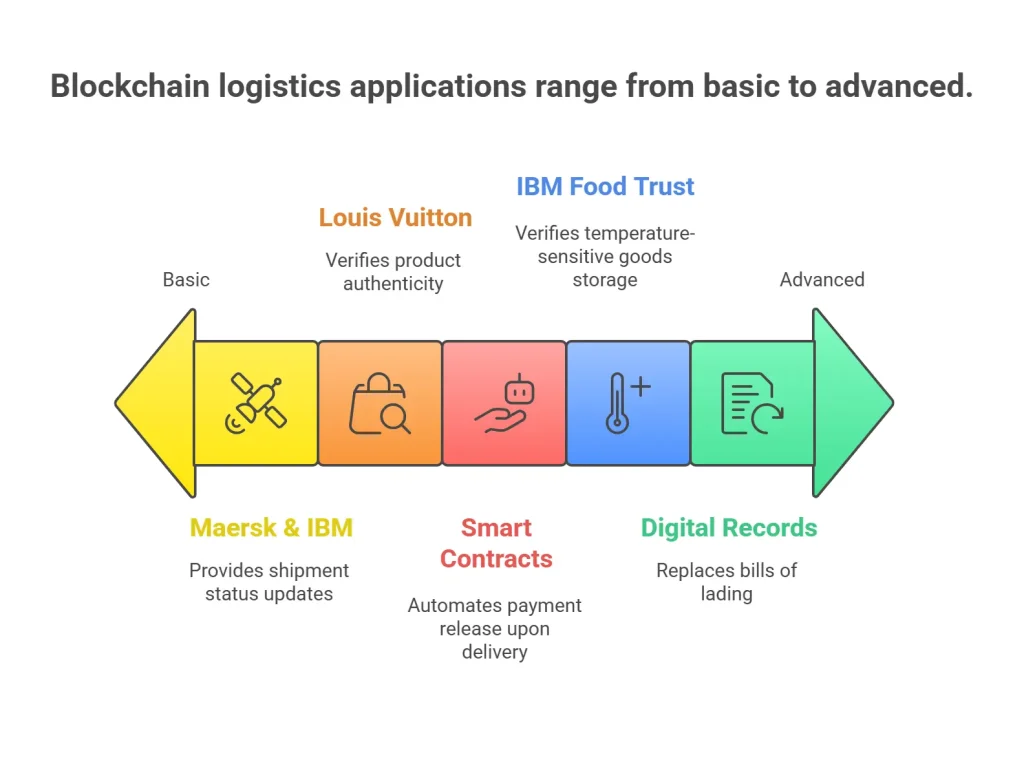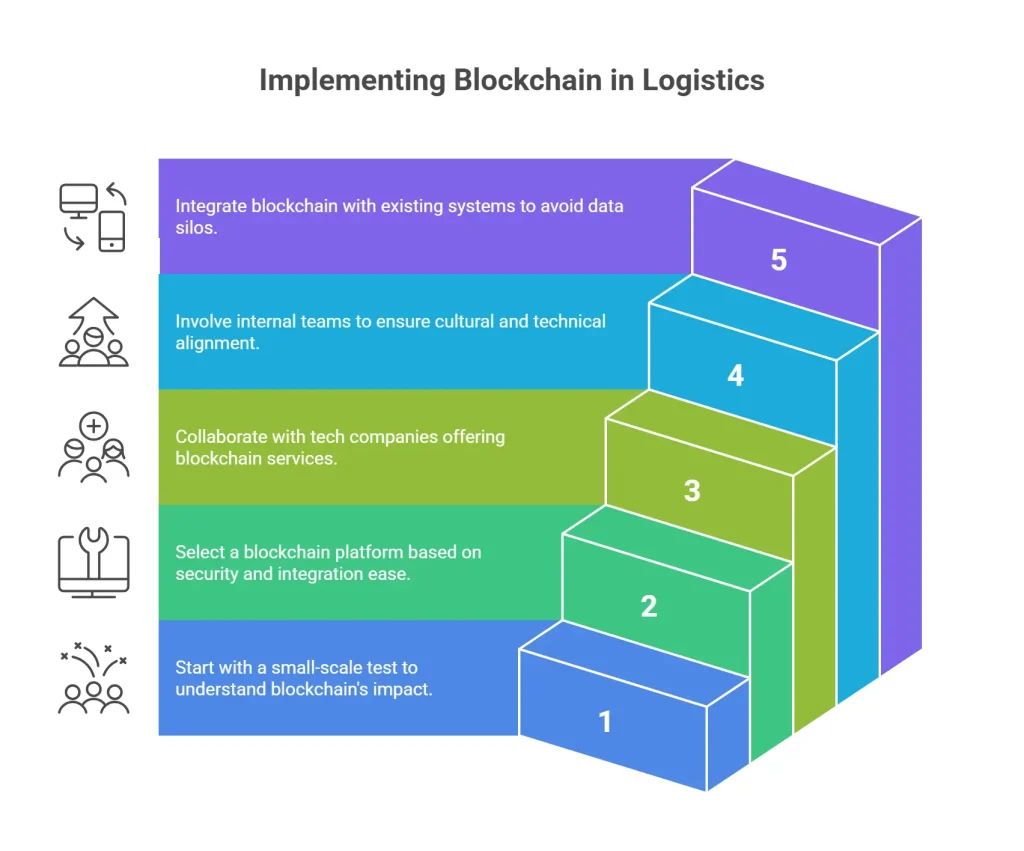When we talk about solving today’s supply chain challenges like shipment delays, lost goods, counterfeits, or lack of transparency, blockchain logistics might not be the first solution that comes to mind.

But maybe it should be. Originally built to support digital currencies, blockchain technology in supply chain management is now proving to be a powerful ally in logistics.
It’s changing how companies track goods, verify transactions, and build trust across partners, without needing a massive tech overhaul.
In this blog, we’ll explore the benefits of blockchain in logistics, real-world examples of how global giants are using it, and practical ways to get started. If you’ve ever wondered whether blockchain is more than just hype, you’re in the right place.
Let’s break it down.
What Exactly is Blockchain in Simple Terms?
Blockchain is a decentralized, tamper-proof digital ledger. Every transaction is recorded across a network of computers (called nodes), ensuring that the data cannot be altered retroactively.
In logistics, it means you can track goods, verify records, and ensure trust among multiple stakeholders without needing a centralized authority. Unlike traditional databases, blockchain creates a transparent and unchangeable trail of data.
Let’s look at how this works in the logistics world.
Use Cases of Blockchain Logistics

Here’s how some companies are applying blockchain technology in supply chain management:
1. Real-Time Shipment Tracking
Companies like Maersk and IBM are using blockchain to provide real-time updates on shipment status across global ports. This eliminates data silos and reduces delays.
2. Fraud Prevention
Luxury brands such as Louis Vuitton are using blockchain to prevent counterfeit goods. Each product has a unique blockchain entry to verify authenticity across the chain.
3. Automated Payments with Smart Contracts
With blockchain, payment terms can be automated. For instance, once a shipment is confirmed as delivered, payment is automatically released – no invoicing delays.
4. Cold Chain Monitoring
In pharma and food industries, blockchain helps verify that temperature-sensitive goods like vaccines were stored correctly. IBM Food Trust does this for clients like Nestlé and Walmart.
5. Paperless Trade Documentation
Traditional bills of lading are being replaced with blockchain-based digital records, drastically reducing fraud and paperwork.
Now that we’ve seen how blockchain is used, let’s understand why it’s worth the effort.
Key Benefits of Blockchain in Logistics
Here’s a breakdown of the top benefits of blockchain in supply chain logistics:
| Benefit | What It Solves |
| Transparency | All parties access the same immutable data |
| Traceability | Track every product from origin to delivery |
| Efficiency | Reduces manual paperwork and errors |
| Cost savings | Cuts out intermediaries and delays |
| Security | Tamper-proof and encrypted transactions |
For example, FedEx uses blockchain to track high-value cargo and ensure no record can be manipulated. This has helped them reduce disputes significantly.
Understanding the benefits is great, but how do you get started? Let’s read further.
Implementation Tips for Blockchain Logistics

While blockchain sounds complex, you don’t need a complete overhaul to start. Here are practical tips:
1. Start with a Pilot Program
Select one use case – such as tracking shipments or verifying documents—and roll out blockchain in a small test group.
2. Choose the Right Platform
Popular blockchain platforms for logistics include Hyperledger Fabric, Ethereum, and VeChain. Choose based on security, speed, and ease of integration.
3. Partner with Tech Providers
Work with companies offering blockchain-as-a-service (BaaS). IBM, Oracle, and SAP have logistics-specific BaaS tools.
4. Get Internal Buy-In
Involve your IT, legal, and logistics teams early. Blockchain is a culture shift as much as it is a tech shift.
5. Focus on Interoperability
Ensure your blockchain can integrate with existing ERP or WMS platforms to avoid soiling.
That covers the how-to. Let’s now answer a question everyone asks: is it scalable?
Is Blockchain Scalable for Large Supply Chains?
Absolutely. Companies like Walmart and Unilever are already using blockchain across thousands of SKUs.
Walmart, for instance, tracks the origin of mangoes and pork using IBM’s blockchain platform, reducing trace-back time from 7 days to 2.2 seconds.
The key is modular scaling: start small, prove ROI, and expand.
The Future of Blockchain Logistics
Expect wider adoption in:
- Sustainability audits
- ESG reporting
- Labor rights compliance
- Global trade finance
Governments in Singapore and the EU are already exploring blockchain for cross-border customs and tax transparency.
FAQs: How Blockchain is Reshaping Logistics in 2025
1. Is blockchain expensive to implement?
It can be costly upfront, but pilot programs and BaaS solutions reduce initial investments. Long-term ROI justifies the cost.
2. Can blockchain work with legacy systems?
Yes, through APIs and middleware platforms that enable secure data exchange.
3. Is blockchain secure?
Very. Once data is added, it cannot be altered, and every transaction is encrypted and validated by the network.
4. Which industries benefit most?
Logistics, pharma, food, luxury goods, automotive – any industry where traceability is critical.
5. Does blockchain require all parties to adopt it?
Ideally, yes. But many platforms now allow phased adoption with partial participation.
Conclusion
Blockchain isn’t a futuristic concept anymore. It’s already improving how goods are tracked, verified, and delivered in real-time across borders. From counterfeit prevention to smarter contracts, the benefits of blockchain in logistics are hard to ignore.
As global trade becomes more digitized and customer expectations for transparency rise, blockchain technology in supply chain management is fast becoming a must-have, not a nice-to-have.
Start small. Scale fast. And most importantly, stay transparent.






